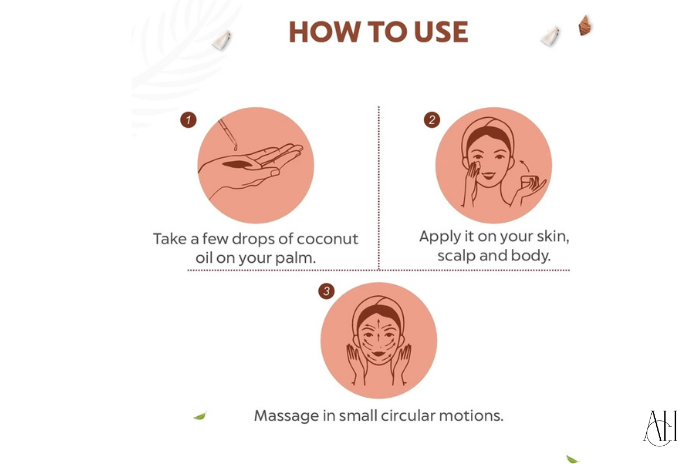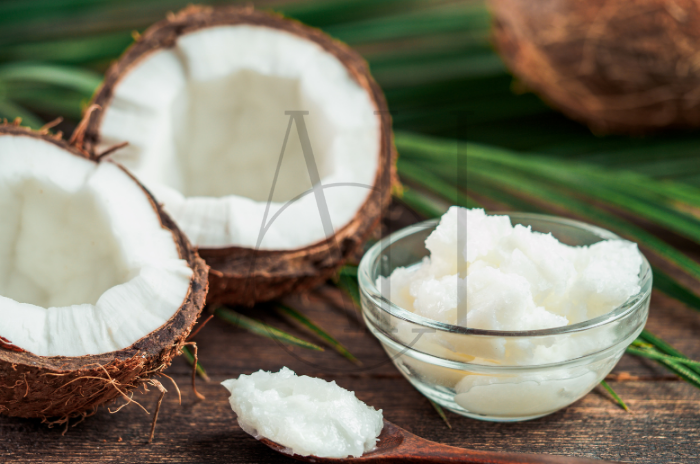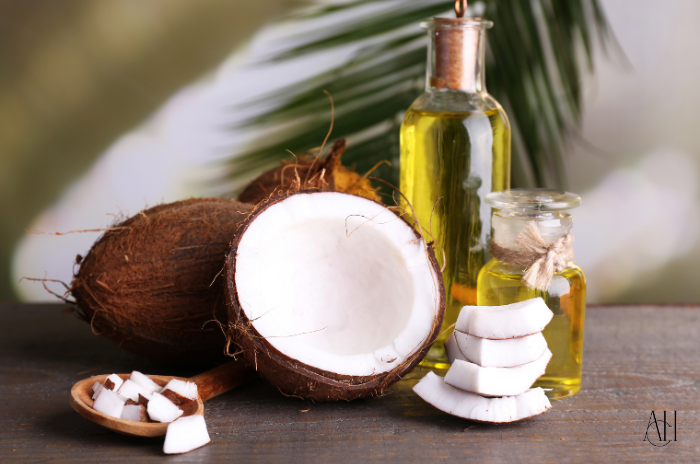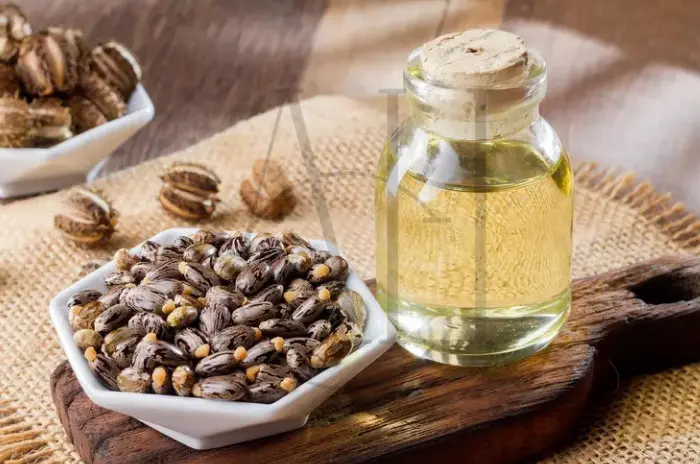Coconut oil has been hailed for centuries as a natural remedy for maintaining lustrous, healthy hair. Packed with nutrients like fatty acids, antioxidants, and lauric acid, coconut oil for hair is a go-to solution for many looking to restore shine, moisture, and strength. Whether you have curly, fine, or damaged hair, using coconut oil the right way can transform your haircare routine.
Table of Contents
ToggleWhat Is Coconut Oil and Why It’s Good for Hair
Definition and Types (Virgin vs. Refined)
Coconut oil for hair can be either virgin (unrefined) or refined. Virgin coconut oil is extracted from fresh coconut meat without using chemicals or high heat, preserving most of its nutrients. Refined coconut oil is processed and has a neutral scent and taste, often used in cooking but still beneficial for hair with fewer natural compounds. Virgin oil is often preferred in haircare because it maintains more of its natural antioxidants. Refined versions may be suitable for those sensitive to scent or seeking a lighter texture.
Key Components Like Lauric Acid & Fatty Acids
The key ingredient in coconut oil hair care is lauric acid, a medium-chain fatty acid that penetrates the hair shaft deeply. Additionally, it contains capric acid and vitamin E, which help nourish the scalp and promote softness. These components work together to protect the hair’s natural protein structure. The antimicrobial properties of these acids also help maintain scalp health. This unique composition makes coconut oil one of the most effective natural oils for hair.
Benefits of Coconut Oil for Hair
Protects and Moisturizes Hair
Coconut oil benefits include creating a barrier that locks in moisture. It coats the hair strands and helps retain hydration, which is especially useful for dry and brittle hair. This protective layer minimizes environmental damage from wind and sun. Regular use results in improved elasticity and overall hair texture. It also helps to maintain a healthy shine throughout the day.
Repairs Damaged Hair
Applying coconut oil for hair regularly can reverse signs of damage caused by heat styling or coloring. The oil fills in gaps in the cuticle layer and helps restore elasticity. Over time, hair becomes more manageable and less prone to breakage. This repair process also leads to fewer split ends. With consistent application, hair appears healthier and more vibrant.
Helps Regrow Hair After Chemotherapy
While not a cure, coconut oil hair growth support is valuable after chemotherapy due to its ability to nourish the scalp. Massaging the oil into the scalp stimulates blood flow, encouraging healthier follicles. Its calming properties also soothe post-treatment dryness or irritation. The hydration helps reduce flakiness and discomfort. This gentle care can support the regrowth journey post-treatment.
Manages Dry Scalp & Dandruff
Coconut oil for dandruff and itch works due to its antimicrobial and antifungal properties. Regular use helps reduce flaking, itching, and dryness. For best results, use it as a pre-shampoo treatment to loosen dandruff and hydrate the scalp. The oil’s soothing properties can alleviate redness and inflammation. It also supports a balanced scalp microbiome.
Helps Prevent Protein Loss
Hair is primarily made of protein, and studies show coconut oil for hair helps prevent protein loss during washing. Unlike other oils, coconut oil penetrates the shaft and reinforces hair structure. This makes it ideal for frequent washers or chemically treated hair. Protein preservation contributes to stronger strands over time. As a result, hair appears fuller and less prone to breakage.
For Curly or Textured Hair
Coconut oil hair care is excellent for textured and curly hair, which tends to be drier. It enhances curl definition while reducing frizz. Just a small amount goes a long way in detangling and protecting coils. The oil also helps to maintain moisture levels between wash days. It defines curls without weighing them down.
Adds Shine and Smoothness
One of the easiest ways to boost shine is to apply coconut oil through your hair before styling. It reflects light naturally and smooths the cuticle for a polished look. This also adds a silky touch to the ends. The shine enhances color vibrancy and gives hair a healthier appearance. It also reduces the appearance of split ends.
Strengthens the Hair Cuticle
The fatty acids in virgin coconut oil for hair strengthen the cuticle from within. This extra layer of defense reduces mechanical stress from brushing or styling. Stronger cuticles equal fewer split ends. Reinforced cuticles also lead to better moisture retention. This contributes to long-term hair resilience.
Reduces Frizz
Frizz occurs when moisture penetrates porous hair shafts. Coconut oil for frizzy hair acts as a sealant, locking out humidity. The result is smoother, sleeker hair with fewer flyaways. It also helps maintain your style throughout the day. Over time, consistent use makes frizz easier to manage.

How to Use Coconut Oil for Hair
Warm Oil Pre‑Shampoo Treatment
Use coconut oil pre-shampoo mask by warming a tablespoon of oil and applying it from mid-length to ends. Leave on for 30 minutes before shampooing. This pre-treatment reduces protein loss and improves manageability. It’s especially helpful before heat styling. Your hair will feel softer and less tangled post-wash.
As a Conditioner
Apply coconut oil for hair after shampooing as a deep conditioner. Let it sit for 10-15 minutes and rinse thoroughly. It hydrates without the synthetic chemicals found in many commercial products. This method leaves your hair feeling smoother and stronger. It’s ideal for use once or twice a week.
As a Styling Aid
For those with frizzy or thick hair, coconut oil hair routine can include a dab of oil as a styling product. Rub a small amount between your palms and apply lightly to the ends. Avoid roots to prevent greasiness, especially if your hair is fine. It can also be used to define waves or curls. This natural approach replaces chemical-based styling creams.
Overnight Coconut Oil Mask
Use an overnight coconut oil mask for dry hair by coating strands from root to tip, wrapping in a shower cap, and rinsing in the morning. This allows deeper penetration of nutrients. It’s especially effective for restoring brittle, color-treated hair. You’ll notice increased softness and reduced frizz by morning. This method also promotes scalp hydration overnight.
For Sun Protection
Coconut oil provides minimal SPF, making it helpful for UV protection. Apply a thin layer of coconut oil for hair before going out in the sun. It reduces damage from heat and sun exposure. Reapply after swimming or sweating. This method also helps protect color-treated hair from fading.
As a Scalp Treatment
To boost scalp health, gently massage coconut oil scalp treatment into the roots once or twice weekly. This improves blood circulation, nourishes follicles, and relieves itchiness. Leave on for at least 20 minutes before washing. It supports a healthy scalp environment. Regular use can lead to stronger roots and thicker hair.
Leave-In Serum for Frizz Control
Use a light touch of coconut oil for frizzy hair as a serum post-wash. Focus on the ends and avoid applying too much on the scalp. It tames flyaways and gives your style a finished, glossy look. The serum adds softness without buildup. It works well on both straight and curly styles.
Application Tips for Best Results
Warm the Oil Before Use
Heating virgin coconut oil for hair until it’s liquified improves absorption. You can warm it by placing the jar in hot water for a few minutes. Warm oil penetrates more effectively into hair strands. Avoid microwave heating to preserve nutrients. Always test the temperature before applying to scalp.
Make Blends & Add Essential Oils
Mixing coconut oil and essential oils for hair such as lavender or rosemary can boost benefits. These combinations enhance growth, scent, and scalp stimulation. Essential oils also reduce the heaviness coconut oil may cause on fine hair. Popular choices include peppermint, tea tree, and cedarwood oils. Customize your blend based on specific hair goals.
Apply Overnight vs. During the Day
For maximum hydration, opt for an overnight application. For lighter conditioning, apply coconut oil tips during the day and rinse after a few hours. Adjust frequency based on your hair type and condition. Overnight use is great for dry hair; daytime use is quicker for busy schedules. Be sure to cover your hair with a scarf or cap overnight.
Apply Lightly Based on Hair Type
Is coconut oil good for fine hair? Yes, but only in moderation. Heavier application suits coarse or curly textures better, while finer hair benefits from light ends-only use to avoid greasiness. Start with a pea-sized amount and increase gradually. Observe how your hair reacts after each use.
Perform a Patch Test
Before trying coconut oil for hair, do a patch test to check for allergic reactions. Apply a small amount behind your ear and wait 24 hours. It’s a safe way to ensure compatibility. This is especially important for sensitive or allergy-prone skin. Monitor for any signs of redness or irritation.
Potential Drawbacks of Coconut Oil
Risk of Allergic Reaction
While rare, some may experience contact dermatitis or itching after using coconut oil for hair. Discontinue use if irritation occurs. Always do a patch test first. Consider using alternative oils if you react. Allergic responses may worsen with repeated exposure.
Not a Treatment for Serious Scalp Conditions
Coconut oil scalp treatment helps with mild dryness, but not medical issues like psoriasis or fungal infections. Consult a dermatologist for persistent scalp concerns. Natural treatments are supportive but not curative. Use coconut oil in combination with professional advice. Misuse may worsen certain conditions.
May Weigh Hair Down
Coconut oil buildup can occur if too much is used, especially on fine or oily hair. Use sparingly and always rinse thoroughly. Build-up may leave hair limp and greasy. This can make styling more difficult. Clarifying shampoos can help remove excess.
Possible Pore Clogging
Applying coconut oil for dandruff and itch too frequently may clog pores on the scalp. This can exacerbate acne or folliculitis in sensitive individuals. Use a clarifying shampoo regularly to avoid residue. Rinse thoroughly after scalp treatments. Clean application tools between uses.
Can Cause Buildup
Even when used correctly, coconut oil can build up over time. Alternate with water-based products or use a sulfate-free clarifying shampoo. Proper washing keeps your coconut oil hair routine fresh. Overuse may dull your hair’s appearance. Maintain balance by rotating your treatments.
Choosing the Right Coconut Oil
Unrefined (Virgin) Coconut Oil
Virgin coconut oil for hair retains more nutrients due to minimal processing. It has a mild coconut aroma and is best for deep conditioning treatments. Always opt for organic, cold-pressed virgin oil when possible. It’s richer in antioxidants and natural enzymes. Choose this for maximum nourishment.
Refined Coconut Oil
Refined coconut oil is more processed and has less scent, which some users prefer. Though it lacks some antioxidants, it’s lighter and may be better for oily scalps. Choose refined oil if you need minimal aroma. It also has a longer shelf life. Ideal for use in hot weather or high-heat settings.
Cold-Pressed and Organic Options
Cold-pressed coconut oil for hair is extracted without heat, preserving antioxidants. Organic options ensure no pesticides or synthetic additives. Together, they provide the purest form for hair health. Look for USDA or ECOCERT certifications. Store in a cool, dry place to maintain quality.

What Makes Coconut Oil Good for Hair?
High in Lauric Acid
Lauric acid coconut oil hair benefits include superior penetration and protein binding. It protects hair from breakage and enhances strength. This acid sets coconut oil apart from other oils. It helps maintain the internal structure of the hair. Consistent use leads to stronger and healthier hair over time.
Penetrates Hair Shaft
Coconut oil is one of the few oils proven to enter the hair shaft. This deep absorption prevents damage from washing and styling. It’s especially helpful in reducing hygral fatigue. By keeping moisture levels stable, hair becomes less prone to swelling and breakage. This internal nourishment ensures better elasticity.
Antimicrobial Properties
Coconut oil for dandruff and itch works thanks to its antifungal and antibacterial effects. It combats microbes responsible for dandruff and scalp irritation. Use regularly for a balanced scalp. These properties help minimize inflammation and discomfort. Healthy scalp conditions promote optimal hair growth.
Common Coconut Oil Hair Treatments and Their Benefits
| Treatment Type | Main Ingredients | Purpose |
|---|---|---|
| Warm Pre-Shampoo Mask | Coconut oil | Moisture and protein protection |
| Overnight Mask | Coconut oil, shower cap | Deep hydration, repair |
| Dandruff Treatment | Coconut oil, tea tree oil | Anti-fungal, soothe scalp |
| Frizz Control Serum | Coconut oil | Smooth flyaways, add shine |
| Hair Growth Mask | Coconut oil, castor oil | Stimulate follicles, improve thickness |
How Often Should You Use Coconut Oil in Hair?
Use coconut oil for hair 1-3 times per week depending on your hair type. Dry or curly hair can handle more frequent treatments, while oily hair may only need a weekly application. Overuse may cause buildup, so find a balance that suits your hair. Observe how your hair responds after each use. Modify usage based on seasonal or hormonal changes.
DIY Coconut Oil Hair Mask Recipes
Coconut Oil + Apple Cider Vinegar Mask
Mix 2 tbsp of coconut oil for hair with 1 tbsp of apple cider vinegar. Apply to scalp and leave for 20 minutes before rinsing. This helps with dandruff and restores pH balance. The vinegar also helps remove buildup. This mask can be used once a week.
Coconut Oil + Honey + Aloe Vera Mask
Blend coconut oil and honey hair mask with fresh aloe vera gel. Apply from scalp to ends and cover for 30-45 minutes. It nourishes, soothes, and hydrates deeply. Honey acts as a humectant to attract moisture. Aloe adds calming and healing effects.
Coconut Oil + Castor Oil Growth Mask
Mix equal parts coconut oil hair growth and castor oil. Massage into scalp and hair, leave for one hour, and shampoo. Ideal for thickening and regrowing hair. Castor oil promotes follicle activity. Coconut oil supports overall hair health.
Applying Coconut Oil to Wet or Dry Hair
For deep conditioning, apply coconut oil for hair to dry hair before washing. Wet hair applications help seal moisture in. Experiment with both to see which gives better results for your texture. Dry applications allow better absorption. Wet usage is better for quick hydration boosts.
Is Coconut Oil Right for Your Hair Type?
Thick, Coarse, Dry Hair
Best suited for coconut oil hair care, as it hydrates and adds shine. Use generously on lengths and ends. It helps reduce tangles and protects against breakage. Ideal for protective styling. Helps retain moisture longer.
Curly or Textured Hair
Ideal for enhancing curls, reducing frizz, and retaining moisture. A key component of many curly hair routines. Helps with detangling and elasticity. Reduces shrinkage. Preserves definition between washes.
Fine or Thin Hair
Can be heavy on fine hair, so apply sparingly. Focus on ends, and avoid roots. Use lightweight blends or dilute with essential oils. Helps manage flyaways. Best used as a pre-wash treatment.
Color-Treated or Chemically Processed Hair
Coconut oil for hair helps restore protein and prevent color fading. Use it as a weekly treatment. It minimizes dryness caused by coloring. Helps maintain vibrancy. Prevents cuticle lifting from chemical exposure.
Coconut Oil and Hair Growth—What You Need to Know
Moisture and Protection vs. Actual Follicle Stimulation
Coconut oil hair growth promotes retention, not regrowth. It reduces breakage and split ends, helping you retain length. It does not stimulate follicles like minoxidil. Instead, it nurtures the environment for healthier strands. Use alongside scalp massages for best results.
How Improved Hair Health May Reduce Breakage
By strengthening and moisturizing hair, it minimizes breakage. This results in the appearance of faster growth over time. Reduced shedding means fuller-looking hair. Hair retains thickness for longer periods. Leads to stronger growth cycles.
Coconut Oil vs. Other Hair Oils
Coconut vs. Olive Oil
Coconut oil for hair penetrates better due to its lauric acid content. Olive oil is more surface-acting and better for sealing. Coconut oil is better for protein loss prevention. Olive oil adds extra moisture but doesn’t enter the shaft. Use olive oil for extra softness.
Coconut vs. Argan, Jojoba, Castor Oils
Each oil has its strengths. Argan is lighter, jojoba mimics scalp oils, and castor is growth-oriented. Coconut oil excels in deep nourishment. Choose jojoba for oily scalps. Select castor for regrowth goals.
When to Choose Coconut Oil in a Blend
Use coconut oil for hair as a base in DIY masks. Blending with other oils allows customization based on hair needs. Add essential oils for added benefits. Tailor blends for hydration, growth, or shine. Helps reduce heaviness for fine hair types.
Who Should Use Coconut Oil—And Who Should Be Cautious
Ideal for Dry, Damaged and Color‑Treated Hair
Best results are seen in dry, brittle hair types. It restores softness and elasticity. Helps repair weakened cuticles. Works well in deep conditioning routines. Especially beneficial after heat styling or bleaching.
Use Sparingly on Fine or Oily Hair to Prevent Greasiness
Coconut oil tips for fine hair include using minimal amounts. Always rinse thoroughly. Apply only to ends. Avoid heavy applications or overnight use. Use clarifying shampoo weekly.
Signs of Buildup or Brittleness
If your hair feels stiff or heavy, reduce usage. Consider rotating with lighter oils. Wash with clarifying shampoos. Monitor how your hair responds. Adjust frequency to maintain softness.
How to Apply Coconut Oil to Your Hair
Pre‑Shampoo Treatment
Apply coconut oil for hair 30 minutes before washing. Focus on the ends and dry spots. Cover with a warm towel for deeper absorption. Rinse thoroughly with a sulfate-free shampoo. Repeat once or twice weekly.
Spa‑Style At‑Home Mask
Wrap hair in a warm towel after applying. This boosts absorption and relaxes the scalp. Leave it on for at least 45 minutes. Follow with a mild shampoo. Ideal for self-care days.
Frizz‑Fighting Touch‑Up
Rub a drop of oil between your palms and smooth over flyaways. Best used on dry, styled hair. Avoid using too much. Adds a glossy finish. Controls static in dry climates.
Scalp Treatment for Flakes
Massage into scalp and leave for 15-20 minutes before shampooing. Combats flakes and dryness. Improves blood circulation. Use a gentle scalp brush for even coverage. Follow with anti-dandruff shampoo if needed.
FAQ for Best Ways to Use Coconut Oil for Strong Healthy Hair
What are the main benefits of using coconut oil for hair?
Coconut oil for hair helps moisturize, reduce protein loss, repair damage, and add shine. It also offers antimicrobial benefits for scalp health. It’s versatile across hair types.
Is virgin or refined coconut oil better for hair?
Virgin coconut oil is best as it retains more nutrients. However, refined oil may suit those with oily scalps due to its lighter texture. Choose based on your hair needs.
How often should I use coconut oil on my hair?
1 to 3 times a week is ideal, depending on your hair’s dryness and texture. Fine hair types may require less frequent use to avoid buildup.
Can coconut oil help with hair growth?
It supports hair growth indirectly by reducing breakage and maintaining scalp health. It doesn’t stimulate follicles but aids in length retention.
What are some effective ways to apply coconut oil to hair?
Popular methods include pre-shampoo masks, overnight masks, and frizz serums. Choose based on your hair goal—moisture, repair, or styling.
Are there any potential drawbacks or side effects of using coconut oil on hair?
Yes, overuse can cause buildup and make hair greasy or brittle. It may also clog pores or trigger allergies in sensitive individuals.
Is coconut oil suitable for all hair types?
Yes, but application must be tailored. Thick or curly hair benefits most; fine or oily hair requires careful, limited use.
How does coconut oil compare to other hair oils like argan or olive oil?
Coconut oil penetrates deeply due to lauric acid. Argan is lighter and great for shine, while olive oil excels at sealing moisture. Each has unique benefits.




